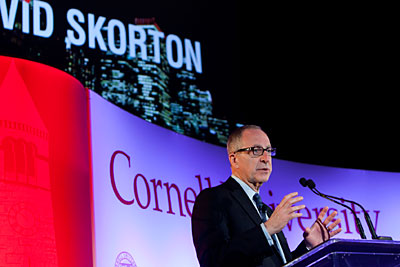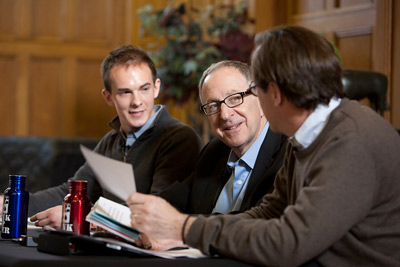Accepting board's endorsement, President David Skorton outlines his vision for the future of Cornell
By Susan Kelley


As David J. Skorton begins his sixth year at the helm of Cornell University, he is sharing with the campus his vision for 2015 as Cornell prepares to celebrate its sesquicentennial. His principal priorities, he notes, are student access, faculty renewal, globalization and public engagement.
Over the past 146 years, Skorton emphasized, Cornell has remained true to the founding principles captured in Ezra Cornell's "any person ... any study." "We will keep the momentum going as we approach the sesquicentennial, with immediacy and intensity and the promise of a tomorrow that we have yet to imagine," he says.
The Cornell Board of Trustees has endorsed Skorton's leadership.
"Board members were delighted to express their enthusiastic and unanimous support for Dr. Skorton, who has guided Cornell through challenging times and set the course for the university in the future, through a formal request that he continue in office," says Board of Trustees Chairman Peter C. Meinig '61.
"The board is very pleased with the direction that the president has set for Cornell, and I am personally grateful for the opportunity to work with David to realize our collective aspirations for this great university," adds Robert S. Harrison '76, who will succeed Meinig as chair in 2012.
In outlining his vision, Skorton says that first, the university will ensure access to a Cornell education, noting that during his tenure, Cornell has doubled its investment in financial aid to undergraduates, to a projected $218 million in the 2011-12 academic year from $105 million in the 2006-07 academic year. Looking forward, he says, "The university will continue to honor its heritage by ensuring that all students -- undergraduate, graduate, professional and international -- can complete their degrees without a crushing burden of debt."
Second, Cornell will set the standard for globalization of higher education. Noting the need for a strategic vision of the university's role in such areas as climate change, global health and sustainable development, Skorton is working with the provosts, deans and faculty on the Ithaca campus and at Weill Cornell Medical College to ensure that Cornell remains "a university with global impact and whose graduates, in the fullest sense, are citizens of the world."
Third, Cornell will build on its long and productive history of public engagement. Skorton cites the David R. Atkinson Center for a Sustainable Future, which pursues multidisciplinary research focused on energy, the environment and sustainable economic development, as an example of the type of collaborative outreach that is a Cornell signature. Similarly, Cornell is preparing to answer New York City Mayor Michael Bloomberg's call to create a world-class applied science and engineering campus in the city. "I see us leading the way with revitalized and expanded public engagement, accelerating innovation and economic growth in Ithaca, New York City, New York state and the world," Skorton says.
Fourth, and most importantly as the underpinning for excellence, Skorton emphasizes that as hundreds of professors retire, Cornell must -- and will -- renew its faculty. The university's $100 million initiative aims to hire accomplished and innovative researchers, teachers and thought leaders who will contribute to the advancement of knowledge globally and mentor students at home and abroad. "Faculty renewal is key to everything we hope for in the future of Cornell," Skorton says.
Meinig notes that under Skorton's leadership, Cornell has emerged from the 2008-09 global financial crisis, balancing the budget and moving to a phase of growth. The endowment has staged a dramatic recovery: At $5.27 billion as of July 1, it is close to reaching a pre-crisis high of $5.8 billion, he says. Skorton's other accomplishments, he says, have included speaking out on issues of national and international importance related to higher education, leading economic development in New York state, and helping to raise more than $3 billion in a capital campaign.
Media Contact
Get Cornell news delivered right to your inbox.
Subscribe